Cheapest Autism Assessment UK Guide 2025: Complete Cost Breakdown & Options

Key Takeaways
Finding an affordable autism assessment in the UK doesn’t have to be complicated.
While the NHS offers free assessments with typical waiting times of 12-24+ months, private assessments range from £850-£3,500 depending on your location and provider choice.
The most cost-effective route is often the NHS Right to Choose scheme, which combines NHS funding with private providers, reducing wait times to around 5.5 months.
Alternative affordable options include university clinics (from £1,000), training centers (from £900), and group practices (from £1,200).
Watch out for hidden costs like report amendments (£50-£150) and ensure any provider follows NICE guidelines and has proper qualifications, regardless of price.
Essential Resources:
- NHS Right to Choose Guide for Autism Assessments – Complete walkthrough of using NHS funding for private assessments
- NHS Autism Assessment Information – Official NHS guidance on assessment process
- National Autistic Society Diagnostic Services – Accredited providers and support services
- Clinical Partners Right to Choose – Leading provider of Right to Choose assessments
- Access to Work Scheme – Government funding support for workplace assessments
Introduction:
Did you know that private autism assessments in the UK can cost up to £3,500, making them inaccessible for many families? But don’t worry—there are cheaper autism assessments available!
If you’re searching for the cheapest autism assessment in the UK, this comprehensive 2025 guide explores every possible route, from NHS services to innovative online solutions that won’t break the bank.
Whether you’re seeking an assessment for yourself or a loved one, we’ll help you navigate the complex world of autism diagnostics while keeping costs manageable.
We’ll walk you through NHS and private options, as well as other ways to access cheaper autism assessments without compromising on quality.
How Much Does an Autism Assessment Cost in the UK? Finding Cheaper Autism Assessments in 2025
From the cheapest option, with the NHS offering completely free assessments, to more affordable private alternatives, here’s what you need to know about autism assessment costs in the UK.
Let’s explore your options. The NHS provides free evaluations, which can save you thousands compared to private assessments—though wait times may be longer.
To help you make the best decision, we’ll break down the costs, waiting times, and ways to find cheaper autism assessments without compromising on quality.

Understanding NHS Waiting Times (2025): Is This the Cheapest Autism Assessment Option?
It’s essential to be aware that waiting times for NHS autism assessments in England are currently facing significant challenges. https://www.autism.org.uk/what-we-do/news/autism-assessment-waiting-times-9.
A staggering 90% (191,656) of those waiting have been waiting longer than the recommended 13 weeks set by NICE guidelines.
This situation has worsened considerably, with waiting lists having more than tripled since the publication of the National Autism Strategy in July 2021.
While the exact waiting time will vary depending on your location and the specific Integrated Care Board (ICB), here are some general estimates based on available reports. It is crucial to note that these are estimates and may not reflect your individual experience:
- London: 18-24 months
- Manchester: 24+ months
- Scotland: 12-14 months (potentially shorter, but subject to local variation)
- Wales and Birmingham: 16-24 months
Given these potentially long waits within the NHS system, you may wish to explore the Right to Choose scheme in England. This allows you to select an alternative provider for your assessment.
For example, Clinical Partners reports wait times of around 5.5 months for autism assessments for both adults and children/young people referred after January 9, 2025.
However, you should check the provider’s website for their most up-to-date information before making a referral.
It’s also crucial to seek support and explore all available resources while awaiting assessment
Quick tip: These times can change, so always check with your local NHS service for current waits.
Starting Your NHS Journey:
Getting started is simple.
Book a GP appointment – they’ll guide you through the free NHS process. Everything from your first screening to final assessment costs nothing. Really!
What’s Included in Your NHS Assessment – and How Much Do Private Clinics Charge?
- Professional evaluations
- Observations in different settings
- Detailed developmental history Private clinics charge £1,700+ for these same services!
Private Assessment Options: What’s the Cheapest Route?
2025 Private Assessment Prices:
- London/South East: £1,800-£3,500 (full assessment)
- Other UK areas: £1,200-£2,500
- Online screenings: From £850 (Note: These aren’t full diagnostic assessments)
- First consultations: From £200

Are There Lower-Cost Private Options?
- University clinics (from £1,000)
- Training centers (from £900)
- Group practices with payment plans
- New clinics with special rates
What Extra Costs Should You Watch Out For in Private Assessments?
- School/work documentation
- Report changes
- Travel for observations
- Cancellation fees
- Rush report charges
Smart Ways to Save on a Private Autism Assessment
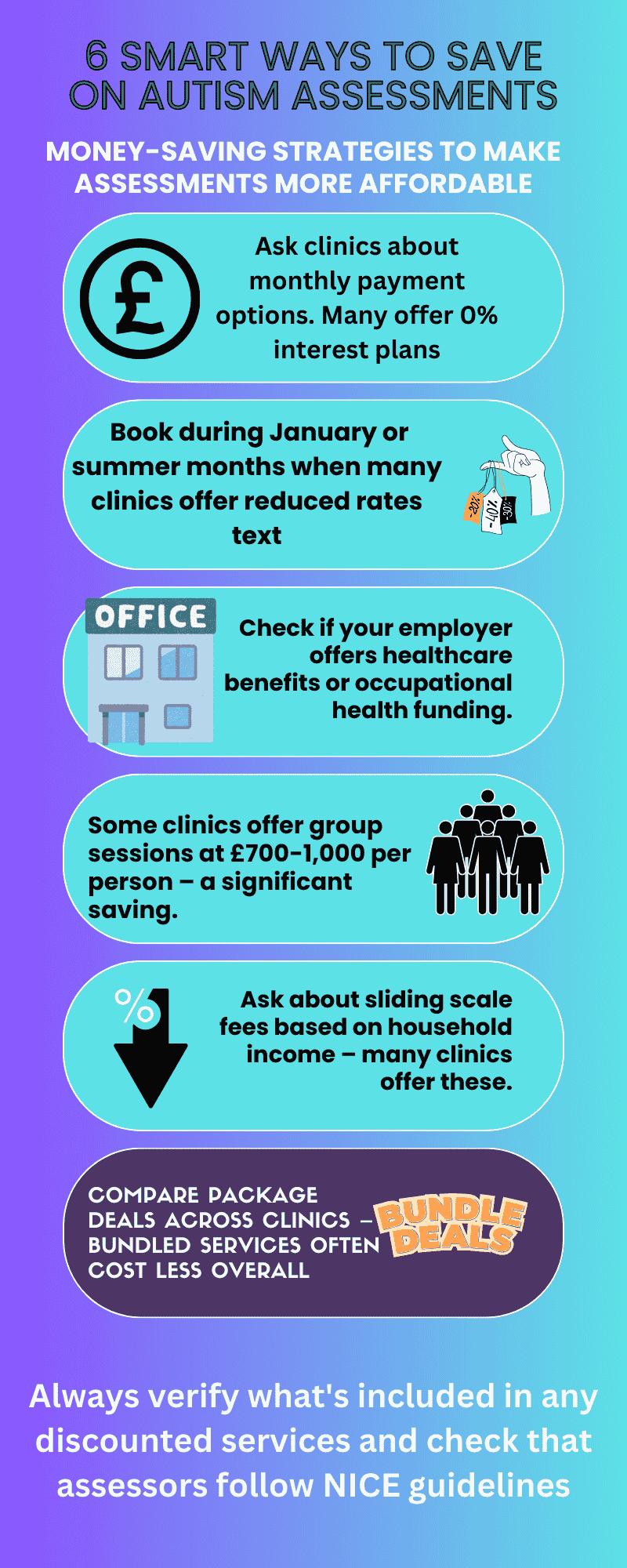
- Ask about payment plans
- Check for off-peak discounts
- See if your employer can help
- Look into group assessments
- Discuss income-based fees
Remember: While cost matters, quality is crucial. Consider the whole picture – waiting times, assessment depth, and follow-up support.
Need Help While You Decide? Access these free resources:
How Does the NHS Autism Assessment Process Work – and Is It Right For You?
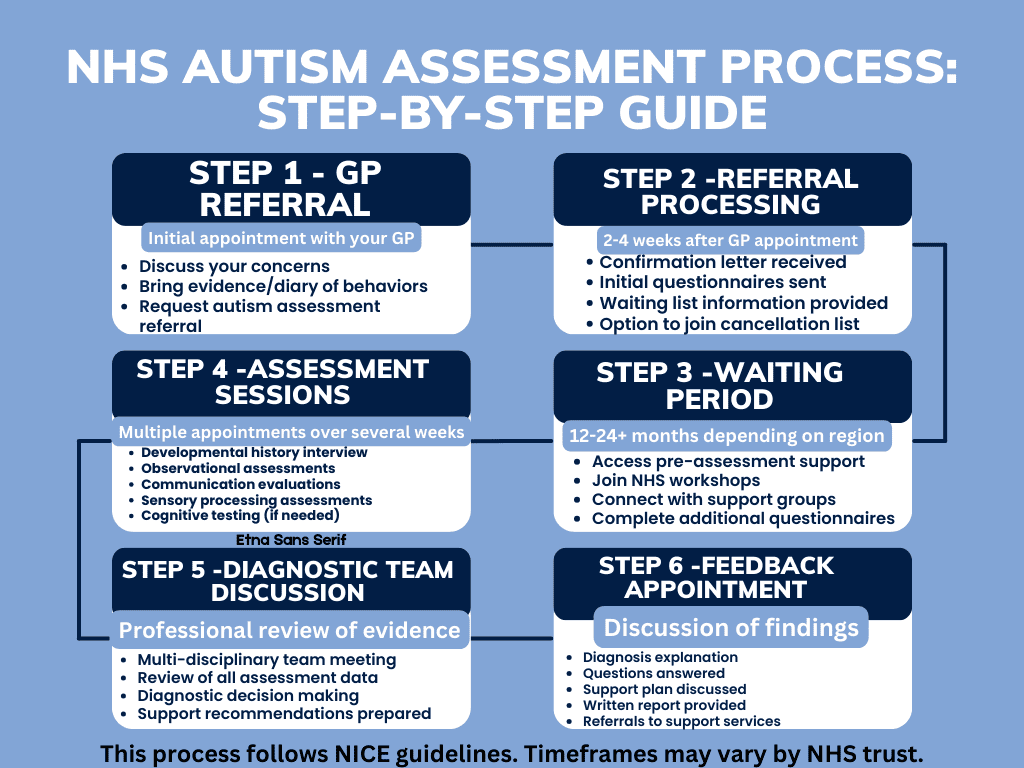
The NHS autism assessment involves several key steps, from initial GP referral to final diagnosis.
Here’s your step-by-step guide to what happens during the process.
Step 1: Initial GP Consultation – What Should You Expect?
Your first step is booking a GP appointment. During this visit, your GP will:
- Ask about your concerns
- Review any evidence you’ve brought
- Discuss your developmental history
- Consider referral to the autism assessment team
Step 2: The Referral Stage – What Happens Next?
Once referred, you’ll typically:
- Receive confirmation within 2-4 weeks
- Get information about local waiting times
- Be asked to complete screening questionnaires
- Have the option to join a cancellation list
Step 3: The Assessment Process – What’s Involved?
NHS autism assessments include:
- Multiple sessions with different professionals
- Observations in various settings
- Interviews about your development
- Cognitive and communication assessments
- Sensory processing evaluations
Step 4: During Your Wait – How Can You Get Support?
Make the most of your waiting time:
- Join NHS pre-assessment workshops
- Access support through your GP
- Connect with local autism groups
- Use NHS online resources
- Consider interim support options
Step 5: The Assessment Day – What Will Happen?
Your assessment will involve:
- Meeting with autism specialists
- Different types of observations
- Discussions about your experiences
- Practical tasks and activities
- Questions about your daily life
What Makes the NHS Process Different (and Potentially More Affordable)?
- Multi-disciplinary team approach
- Comprehensive assessment format
- Evidence-based diagnostic tools
- Clear post-assessment support
- Regular progress reviews
Need Support During the Process?
The NHS offers several resources:
- Pre-assessment information sessions
- Local support networks
- Online guidance tools
- Family support services
- Educational resources
How Do NHS Autism Assessments Work?
The NHS provides thorough autism assessments through a carefully structured pathway. Understanding each stage helps you prepare effectively and know exactly what to expect.
Understanding NICE Guidelines: How Do They Impact the Assessment Process?
The NHS follows strict national guidelines to ensure quality assessments. These include:
- Evaluations by specialist autism professionals
- Comprehensive developmental history assessment
- Multiple observation sessions in different settings
- Sensory and communication assessments
- Information gathering from family, school, or work
- Assessment of impact on daily functioning
Preparing for Your GP Referral: What Should You Bring?
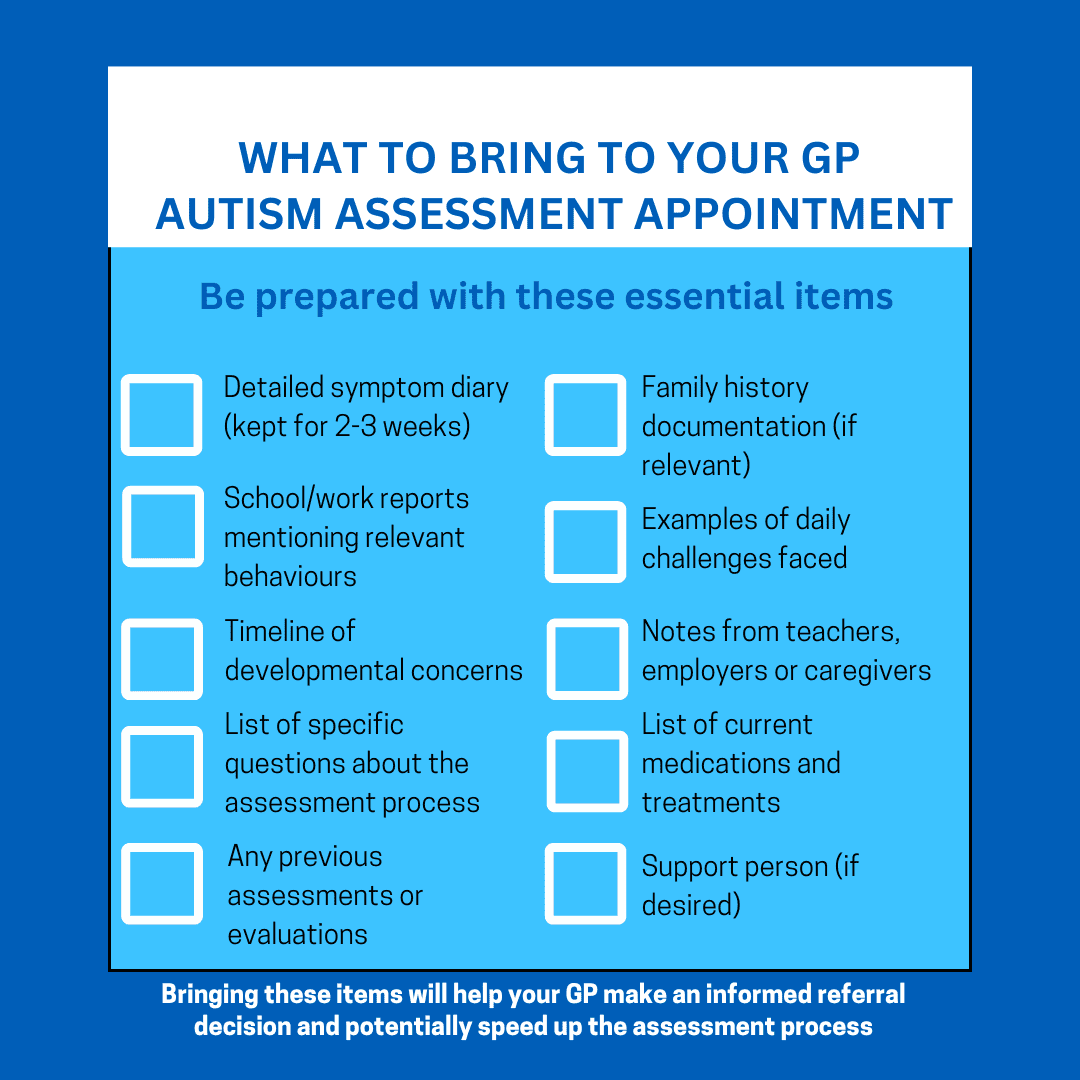
Make your GP appointment count by bringing:
- A detailed diary of autism traits (keep for 2-3 weeks)
- Evidence from school/work about daily challenges
- A clear timeline of developmental concerns
- Family history documentation
- List of specific questions about the process
Request a double appointment to ensure enough time for discussion.
The Referral Journey: What to Expect After Your GP Visit?
After your GP referral, expect:
1. Confirmation letter (usually within 2-4 weeks)
2. Initial screening questionnaires
3. Waiting list information
4. Details about local autism services
5. Information about support while waiting
Assessment Stages Explained: What Happens at Each Step?
Your assessment typically involves:
1. Initial Screening (1-2 hours):
- Basic health checks
- Preliminary questionnaires
- Discussion of main concerns
2. Developmental History (1-2 hours):
- Detailed childhood discussion
- Family history review
- Educational/work history
3. Direct Observations (2+ hours):
- Communication assessment
- Social interaction observation
- Sensory processing evaluation
- Cognitive assessments if needed
4. Team Discussion:
- Professional review meeting
- Assessment of all evidence
- Diagnostic consideration
5. Feedback Session:
- Detailed findings discussion
- Questions and answers
- Support planning if diagnosed
6. Written Report:
- Comprehensive assessment summary
- Recommendations for support
- Access to services information
Getting the Most from Your Assessment: How Can You Prepare?
- Request pre-assessment information packs
- Keep a diary of daily challenges
- Bring a trusted person to appointments
- Ask questions throughout the process
- Take notes during feedback sessions
- Request clarification if needed
Common Questions Answered: What Else Should You Know About NHS Assessments?
Q: Where will the assessment take place?
A: Usually at an NHS clinic, but some assessments can be arranged at home or school/work.
Q: How many professionals will I see?
A: Typically 2-3, including specialists in autism assessment.
Q: What happens after diagnosis?
A: You’ll receive a detailed support plan and access to relevant services.
Q: Can I get help while waiting?
A: Yes, through your GP, local support groups, and NHS mental health services.
Remember: The NHS assessment process is thorough and well-structured. While waiting times vary, you’ll receive a comprehensive evaluation that follows national standards.
How Much Do Private Autism Assessments Cost? (Finding the Cheapest Options)
Quick Summary:
✓ Private assessments: £850-£3,500
✓ Most affordable: Training centres from £900
✓ London prices highest (up to £3,500)
✓ Online screenings from £850
✓ Payment plans widely available
Private Assessment Costs By Region:
London & South East
👉 Starting from: £1,800
👉 Average cost: £2,500
👉 Top clinics: up to £3,500
Real example: Gesher Assessment Centre £2,200, Schoen Clinic from £1,800
Rest of UK Average Costs:
- North: £1,400-£2,500
- Midlands: £1,300-£2,600
- Scotland: £1,200-£2,400
- Wales: £1,300-£2,500
- N. Ireland: £1,200-£2,300
⚠️ Note: Prices vary based on location and assessment complexity
Budget-Friendly Options:
✓ University clinics: from £1,000
✓ Training centres: from £900
✓ Group practices: from £1,200
✓ New clinics: from £1,000
Important: Always check assessor qualifications at lower-cost clinics
Assessment Types Compared:
Online Assessments:
- Basic screening: £300-£500
- Full assessment: £850-£1,500
⚠️ Warning: May need additional in-person sessions
Face-to-Face Assessments:
- Initial consultation: £200-£300
- Complete assessment: £1,200-£2,500
- Follow-up session: £150-£250
What Each Package Includes:
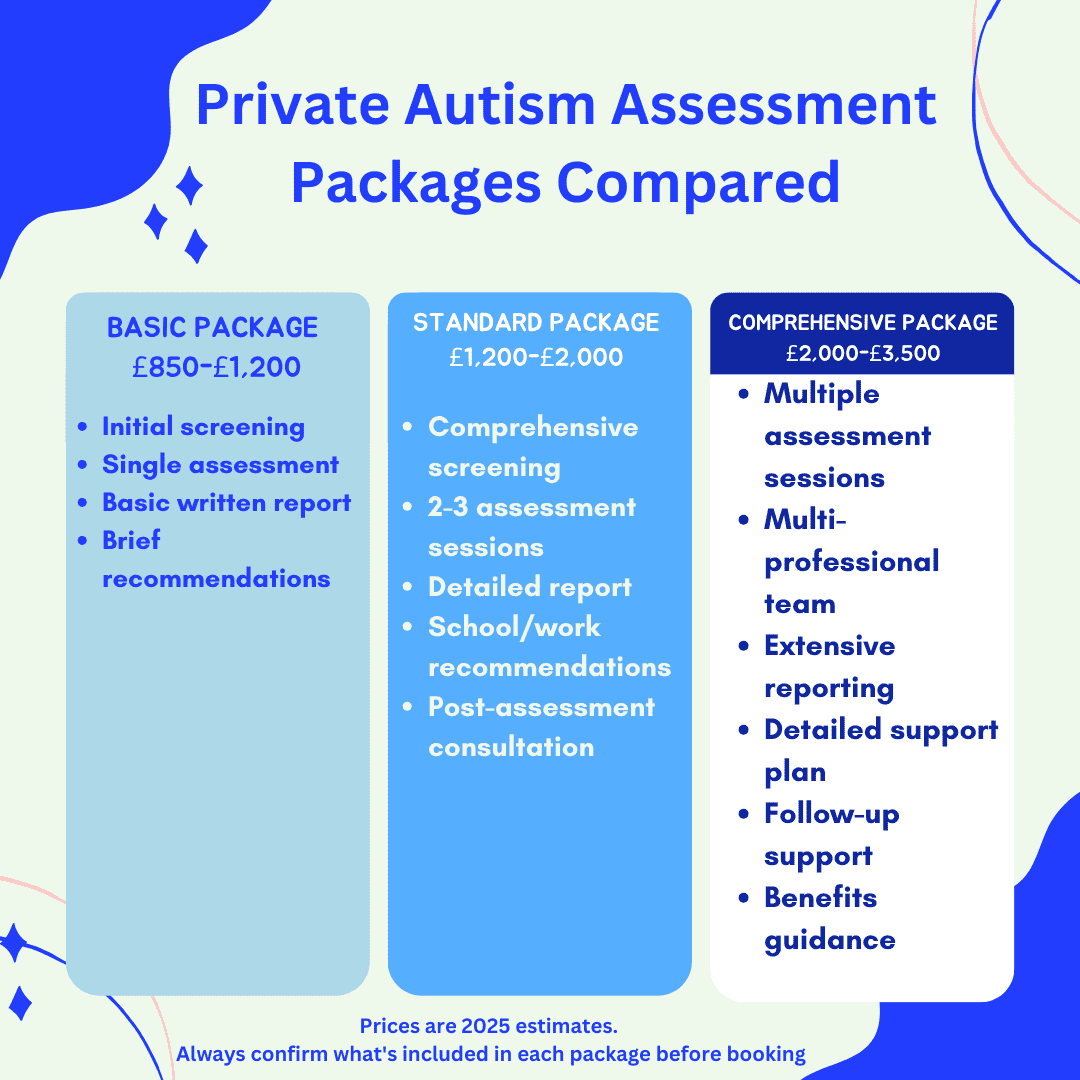
Basic (£850-£1,200):
✓ Initial screening
✓ Single assessment
✓ Basic report
✓ Simple recommendations
Standard (£1,200-£2,000):
✓ Comprehensive screening
✓ 2-3 assessment sessions
✓ Detailed report
✓ School/work recommendations
✓ Post-assessment meeting
Comprehensive (£2,000-£3,500):
✓ Multiple assessment sessions
✓ Multi-professional team
✓ Extensive reporting
✓ Detailed support plan
✓ Follow-up support
✓ Benefits guidance
Hidden Costs to Watch For When Seeking the Cheapest Autism Assessment Options:
⚠️ Report amendments: £50-£150
⚠️ Additional letters: £30-£100
⚠️ Travel costs: £50-£200
⚠️ Cancellation fees: Up to full session cost
⚠️ Rush reports: £100-£300
⚠️ Extra consultation: £80-£150/hour
Save Money With These Tips:
1. Request payment plans
2. Book during quiet seasons
3. Compare multiple clinics
4. Consider group practices
5. Check employer benefits
6. Look for package deals
Before Booking, Check:
✓ Assessor credentials
✓ NICE guidelines compliance
✓ Full cost breakdown
✓ What’s included
✓ Cancellation policy
Need Help Finding a Provider?
Contact the National Autistic Society for their list of accredited professionals.
Disclaimer: All prices are 2025 estimates. Always confirm current rates with providers.
What Are The Cheapest Ways to Get an Autism Assessment?
Charity and Non-Profit Options:
National Autistic Society partnerships
- Local assessment schemes typically range from £500-£900.
- Income-based fee reductions are available.
- Some programs offer free assessments for low-income families.
For more information, visit the [National Autistic Society Diagnostic and Assessment Service](https://www.autism.org.uk/what-we-do/autism-know-how/diagnostic-services).
Autism-specific charities
Many offer regional support programs and subsidized assessments.
- They can also assist with grant applications for funding.
Can University Research Programs Offer Cheaper Autism Assessments?
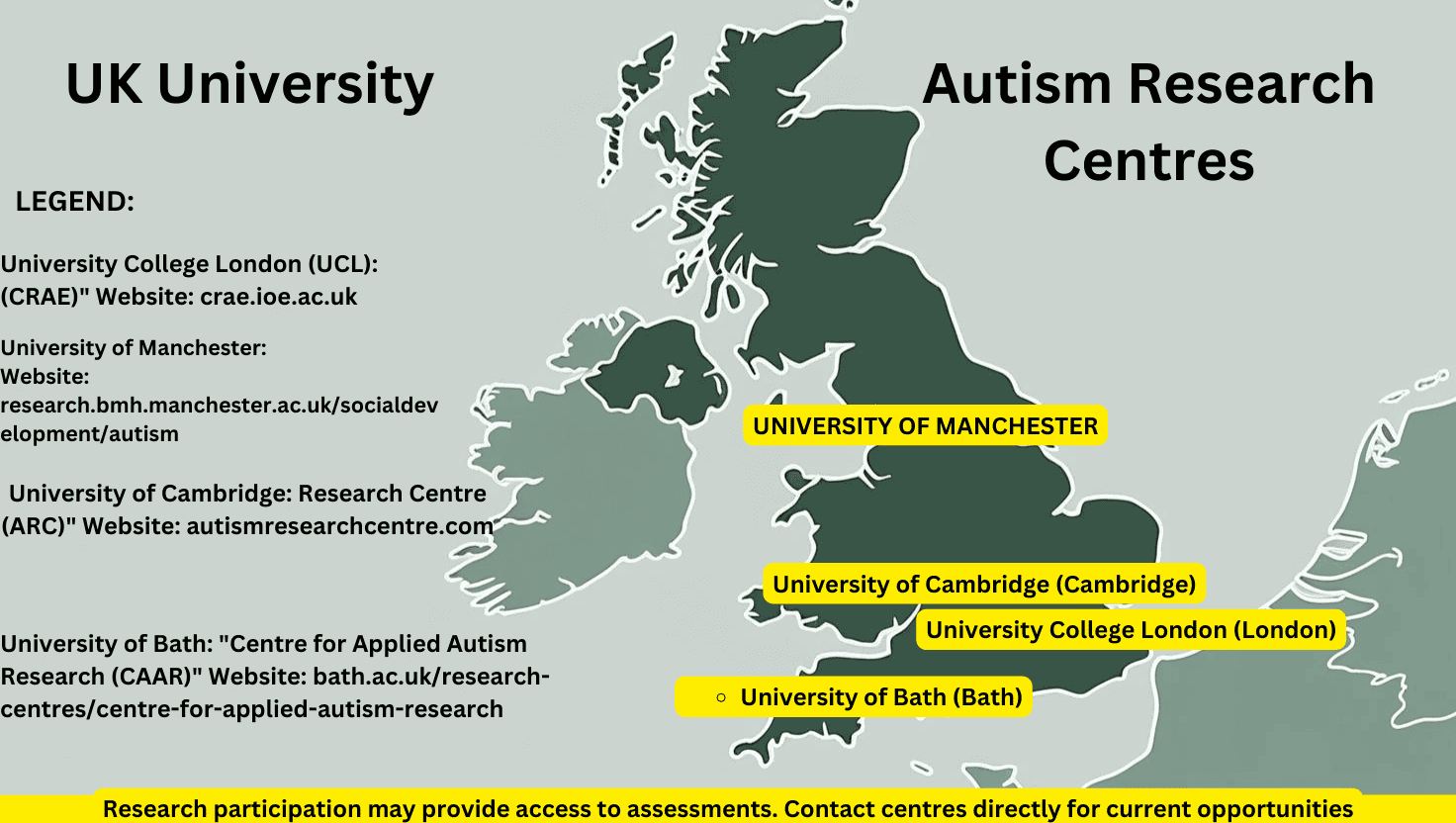
Some universities in the UK conduct autism research and may, as part of specific research studies, offer assessments related to their projects.
These assessments are typically not offered as a general clinical service, and opportunities are often limited and subject to strict eligibility criteria.
However, participation can sometimes provide access to assessments or related services that would otherwise be costly.
How to Explore Potential Opportunities:
- Focus on Leading Research Centers: Some universities are known for their autism research.
Examples include:
- University College London (UCL): The Centre for Research in Autism and Education (CRAE) at UCL (https://crae.ioe.ac.uk or https://www.ucl.ac.uk/ioe/departments-and-centres/centre-research-autism-and-education) conducts a broad program of research.
- University of Manchester: The University of Manchester is a leading UK centre for autism intervention research ( http://research.bmh.manchester.ac.uk/socialdevelopment/aboutus/research/autism/).
- University of Cambridge: The Autism Research Centre (ARC) is based in the Department of Psychiatry, University of Cambridge (https://www.autismresearchcentre.com).
- University of Bath: The Centre for Applied Autism Research (CAAR) focuses on the strengths and challenges experienced by autistic people (https://www.bath.ac.uk/research-centres/centre-for-applied-autism-research/).
- Visit University Websites: Navigate to the websites of these (and other) universities and search for their psychology, education, or medical departments, looking for centers or groups that focus on autism research.
- Contact Researchers Directly: If you identify a research project that seems relevant, contact the researchers directly to inquire about potential opportunities to participate.
Be prepared to ask about:
- The purpose of the research.
- Any assessments that are part of the study.
- Eligibility criteria.
- Whether there are any costs associated with participation.
- Be Realistic: Not all research programs will offer assessments, and those that do may have limited spaces and specific requirements.
Important Considerations:
- Research Focus: Any assessments conducted through research programs are primarily for research purposes.
- Ethical Conduct: Ensure that any participation in research adheres to ethical guidelines and involves informed consent.
- No Guaranteed Cost Savings: While some programs may offer assessments at no cost, this is not always the case.
Remote Assessment Options:
Basic Online Services: Budget-Friendly Choices for Cheapest Autism Assessment UK
- Initial screening: £300-£500
- Full assessment: £850-£1,200
- Follow-up support: £150-£200
Group Assessment Programs:
Small group options (2-3 people)
- Cost: £700-£1,000 per person
- Includes shared sessions plus individual evaluations.
- Often among the cheapest autism assessment UK options after NHS
Financial Support Available:
NHS Funding Routes
- Individual Funding Requests (IFR)
- Exceptional Cases Funding
- CCG discretionary funding
Workplace Support
- Access to Work scheme
- Occupational health funding
- Employee assistance programs
Educational Support
- University disability services
- Student support funding
- DSA assessments
Grant Options:
1. Local Authority Grants
- Disability support funding
- Social care assessments
- Family support packages
2. Charitable Trusts
- Family action funds
- Disability grants
- Income-based support
3. Professional Bodies
- Occupational support
- Professional development funding
- Workplace adjustment grants
Money-Saving Tips for the Cheapest Autism Assessment UK Options:
- Combine funding sources.
- Apply to multiple programs.
- Check eligibility for all schemes.
- Consider group assessments.
- Look for research programs.
Before Choosing the Cheapest Autism Assessment UK Option:
⚠️ Check
- Assessor qualifications
- Assessment comprehensiveness
- Report validity
- Post-assessment support
- Funding requirements
Need Help?
Contact your local autism support service for guidance on available options in your area.
Remember: While these options cost less, they still provide professional assessments following NICE guidelines.
Where Can Adults Get Affordable Autism Assessments?
Looking for adult autism assessment options that won’t break the bank? Let’s explore every route available, from free NHS services to budget-friendly alternatives.
NHS Adult Assessment Services:
Cost: Free
Includes:
- Initial GP consultation
- Specialist adult team referral
- Multi-professional assessment
- Diagnostic report
Support planning
⚠️ Waiting times: 12-24 months (location dependent)
Useful NHS Links:
Private Adult Clinics:
Traditional Services: £1,200-£2,500
- Multi-session assessments
- Adult autism specialists
- Comprehensive reports
- 2-8 week waiting times
- Post-diagnosis guidance
Affordable Private Options:
Training Clinics: £900-£1,200
Learn more: [Clinical Partners Training Clinic](https://www.clinical-partners.co.uk/)
Group Practices: £900-£1,500
- Shared initial sessions
- Individual assessments
- Shorter wait times
- Professional diagnosis
Workplace Support:
Access to Work:
- Government funding available
- Assessment cost coverage
- Details: [Access to Work Scheme]
Occupational Health:
- Employer-funded options
- Workplace adjustments
- Confidential process
Learn more: [ACAS Workplace Guidance]
University Services:
Student Support:
- University disability services
- DSA funding (up to £25,000)
- Campus health services
More info: [DSA Information]
Online Assessment Options – Potentially the Cheapest Autism Assessment UK Route:
Basic Services (£850-£1,200):
- Video consultations
- Remote screening
- Basic reporting
⚠️ May need in-person follow-up
Free Screening Tools:
✓ [AQ-10 Adult]
✓ [Autism Spectrum Quotient Test]
Support Networks:
Money-Saving Tips:
1. Check workplace benefits
2. Explore charity grants
3. Consider payment plans
4. Research university programs
5. Join group assessments
Essential Pre-Booking Checks:
- Verify professional credentials
- Check NICE guidelines compliance
- Get full cost breakdown
- Understand assessment timeline
- Review cancellation policies
Need Support?
Contact the [National Autistic Society Helpline]
Remember: While cost matters, ensuring a thorough, professional assessment is crucial. A proper diagnosis can provide access to vital support and understanding.
How Can You Make Autism Assessments More Affordable?
Please remember that specific details can vary, so it’s crucial to verify information directly with providers and organizations.*
Payment Plans & Financing:
Clinic Payment Options:
Many clinics offer payment plans to spread the cost of an assessment. Always ask about the terms and conditions.
- Monthly installments (typically 3-12 months)
- 0% interest plans (available at select clinics)
- Deposit schemes (20-30% upfront)
- Sliding scale fees based on income (available at select clinics)
Healthcare Finance Companies:
Some companies offer medical payment loans to cover healthcare expenses.
- Interest rates will vary based on your creditworthiness and the lender’s terms.
- Compare offers carefully and always read the fine print before committing to a loan.*
- Flexible repayment terms may be available.
- ⚠️ Important:* Always check the terms carefully!
Insurance Coverage:
Private Health Insurance:
Coverage for autism assessments varies significantly depending on your specific policy.
Contact your insurance provider directly to inquire about coverage.
Key Questions to Ask Your Insurance Provider:
- Does my policy cover autism assessments?
- What percentage of the assessment cost is covered?
- Are there any specific providers I need to use?
- Is a GP referral required?
- Are there any limitations or exclusions related to autism assessments?
- BUPA: Coverage depends on your policy.
- AXA: Coverage depends on your policy.
- Vitality: Coverage depends on your policy.
Workplace Insurance:
- Employee health schemes: Check with your employer.
- Occupational health coverage: Check with your employer.
- Healthcare cash plans: Check with your employer.
- Employee assistance programs: Check with your employer.
Local Authority Support:
Council Assistance:Your local council may offer support for individuals with disabilities.
Contact your local council’s social services department for more information.
- Disability support grants
- Social care assessments
- Emergency funding options
- Family support packages
How to Apply:
1. Contact social services.
2. Request a needs assessment.
3. Apply for available funding.
4. Submit supporting evidence.
Note: The process can vary by local authority.
Community Support Options:
Crowdfunding Platforms:
Consider using crowdfunding to raise funds for your assessment.
- GoFundMe
- JustGiving
- Local community funds
Local Support:
- Community grant schemes
- Charitable trusts
- Religious organizations
- Local autism groups
Seasonal Savings:
The following may be available, but it’s essential to confirm directly with the provider.
When to Book:
- January (New Year offers)
- Summer (quieter periods)
- End of financial year
- Student term times
Special Discounts:
- Multiple booking discounts
- Family assessment rates
- Group assessment options
- Early booking offers
Pro Tips for Saving
1. Combine Resources:
Explore multiple funding sources and discounts to maximize savings.
- Mix funding sources
- Stack available discounts
- Use workplace benefits
- Access charity support
2. Prepare Well:
Thorough preparation can save time and money.
- Complete free screenings first
- Gather all documentation
- Get GP referral letters
- Research all options
3. Compare Providers:
Shop around and compare prices to find the best deal.
- Check all-inclusive costs
- Look for package deals
- Ask about hidden fees
- Verify payment terms
Remember: The NHS provides autism assessments free of charge (though waiting lists apply).
Important Considerations When Seeking the Cheapest Autism Assessment UK Options:
- Many clinics are willing to discuss financial options — don’t be afraid to ask about making assessments more affordable.
- While waiting for assessment, you can access many support services and resources designed specifically for adults exploring autism diagnosis.
- Seeking support for autism is essential, as other health problems may arise from a lack of treatment, which can also be costly.
- This information is intended as a guide only. It is essential to verify all details with the relevant providers and organizations.
Frequently Asked Questions About Autism Assessments
What Happens After Autism Diagnosis in the UK?
After receiving an autism diagnosis in the UK, several support pathways become available:
NHS Post-Diagnosis Support:
- Detailed diagnostic report explaining your assessment
- Referrals to relevant local support services
- Access to autism-specific community support teams
- Information sessions about autism
- Regular follow-up appointments if needed
Education and Employment Support:
- Disability Student Allowance (up to £25,000) for university students
- Workplace reasonable adjustments through Access to Work
- Potential eligibility for disability benefits
- Support from occupational health services
Community Resources:
- Local autism support groups
- National Autistic Society resources and helpline
- Peer support networks
- Family support services
The level of post-diagnostic support varies significantly by region.
NHS services typically provide basic follow-up, while private assessments often include more comprehensive support planning but may charge additional fees for ongoing support.
Many people find joining autism communities, both online and in-person, particularly helpful for practical advice and emotional support after diagnosis.
Conclusion:
While finding an affordable autism assessment in the UK can feel overwhelming, there are multiple pathways to access this vital service without excessive cost.
From NHS services to innovative online solutions, the key is understanding all your options and choosing the one that best fits your circumstances and budget.
Remember, investing in an assessment is an important step toward understanding and support – and with the resources we’ve outlined, you can find a solution that works for your financial situation.
Disclaimer: This information about finding the cheapest autism assessment UK options is intended as a guide only. It is essential to verify all details with the relevant providers and organizations.
While we strive to provide accurate and up-to-date information, we make no representations or warranties of any kind, express or implied, about the completeness, accuracy, reliability, suitability, or availability with respect to the information, products, services, or related graphics contained in this guide for any purpose.
Any reliance you place on such information is therefore strictly at your own risk. We will not be liable for any loss or damage, including without limitation, indirect or consequential loss or damage, or any loss or damage whatsoever arising from loss of data or profits arising out of, or in connection with, the use of this guide.
Always verify details directly with healthcare providers, insurance companies, local authorities, and other relevant organizations.
About the Authors: Dwayne and Charlene are committed to providing accessible and reliable information to families with special needs. Charlene’s extensive experience working with children of all abilities as a professional childminder combines with Dwayne’s personal journey as a father to their son with autism to provide families with a deep understanding of the issues families face. Together, they offer practical guidance and support.



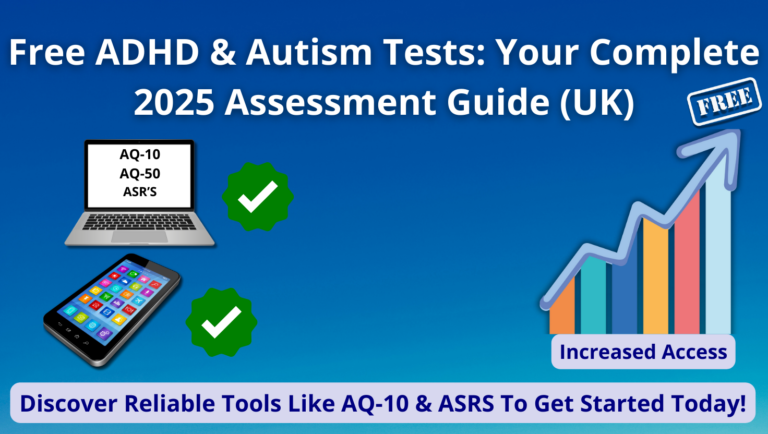
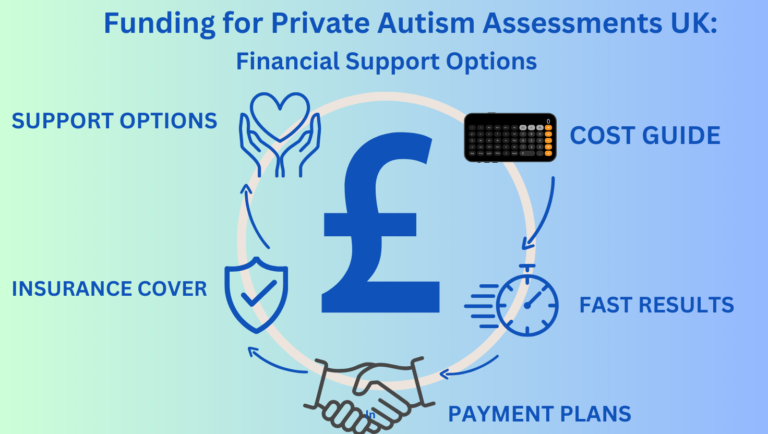
My brother recommended I might like this web site. He was totally
right. This post actually made my day. You cann’t imagine just how much time I had spent for this information! Thanks!
Thank you for your kind words!
I’m so glad the post was helpful-your feedback means a lot.
Big thanks to your brother for the recommendation!